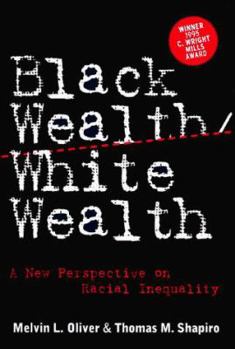Black Wealth/ White Wealth: A New Perspective on Racial Inequality
Select Format
Select Condition 
Book Overview
The award-winning Black Wealth / White Wealth offers a powerful portrait of racial inequality based on an analysis of private wealth. Melvin Oliver and Thomas Shapiro's groundbreaking research... This description may be from another edition of this product.
Format:Paperback
Language:English
ISBN:0415918472
ISBN13:9780415918473
Release Date:January 1997
Publisher:Routledge
Length:242 Pages
Weight:0.96 lbs.
Dimensions:9.3" x 0.8" x 6.3"
Related Subjects
African-American Studies Business & Investing Economic Conditions Economics Macroeconomics Minority Studies Political Economy Political History Political Science Politics & Government Politics & Social Sciences Popular Economics Poverty Social Science Social Sciences Sociology Specific Demographics TextbooksCustomer Reviews
4 ratings
Wealth- the real indicator of inequality in America
Published by Thriftbooks.com User , 14 years ago
The perception of equality and upward mobility in modern America may be a comfort to many Americans. But, these authors- one black and one white, present their theory that entwined into the fabric of our society, there remains inequality. Their theory is well documented as they cite both government statistics and the biographical information of black and white Americans. The book flows well, is interesting, and it is written in such a way that makes data easy to grasp without sacrificing the solid scholarly research to support their thesis. This book's exploration yields explicit examples of the structural inequality that still remains in America today. By using net worth, or true wealth as a yardstick, rather than income, educational or professional attainment, the authors have presented a strong argument that also considers the significant historical mileposts in the struggle for equality. This is a must read for anyone interested a better understanding of the implications of race, class, and the policies and events that have allowed the rich to get richer and the poor to remain poor - especially now as the chasm between the two grows wider. Four stars!
Great Myth Buster
Published by Thriftbooks.com User , 16 years ago
This was very well written and had an abundant series of examples to support the authors' main point--with references to government documents, tables, graphs. Oliver and Shapiro can be extremely repetitive in restating their thesis, but, overall, the book was very eye-opening and perhaps a little depressing. You'd make it a point not invest the majority of your wealth in the home and car after reading this book.
Miles to Go Before We Rest
Published by Thriftbooks.com User , 22 years ago
This book is a fascinating study of the differences between the wealth held by Blacks and Whites in the United States. A historical perspective is provided, yet the book makes clear how the momentum of past actions continue though the present. It was this facet of the book that provided the greatest emotional impact. The authors did an excellent job of stressing the differential effects of income and wealth, and how wealth is by far the better measure for examining economic well-being. The data was broken down and explained according to education, income, housing, and many other variables. Case studies helped to put poignant "faces" on the facts to show how Blacks have been impacted by the differing conditions that they experience. While it is not hard to find examples to the contrary, as I was reading this book, I noticed a growing sense of discomfort with the frequency with which the two races were discussed and compared monolithically. It is not difficult to view one race as victim and the other as oppressor within a historical perspective, but I found myself wanting to believe that it is individuals and groups in the present who decide whether to overcome adversities and utilize opportunities. Unfortunately, this book shows how much further the United States must go to achieve equal opportunities of economic mobility. Published in 1995, the data within this book is now roughly ten years old. Studies published since then indicate that any changes over the last decade have been subtle at best. This book continues to describe conditions that continue to be both important and relevant. I have no hesitation in recommending this book to anyone, regardless of color.
A Sound Attack on the Middle-Class Myth
Published by Thriftbooks.com User , 23 years ago
The arguement that the past thirty years have resulted in a closing of the gap between whites and blacks seems untenable after reading this book. Using wealth instead of income as a measure of success and progress, Oliver and Shapiro argue that glaring inequalities still exist and may actually be growing. Moreover, since creating wealth is far more difficult when one has none to begin, the authors argue that such inequalities are sure to continue unless significant changes are made to the social safety net. These premises certainly call into question the notion of a vibrant black middle class.Overall, I found the book to be scholarly, yet accessible to those who don't hold a Ph.D. in research methodology. The information was nicely balanced; the interviews complemented the extensive survey data and everything was clearly presented. My only complaint is that the statistical information was not presented in the appendix with the tables. This would have been useful and meaningful to academics reading the book. That being said, the thesis is a profound one, and for all those with an interest in social equity and social policy this is a must-read.




